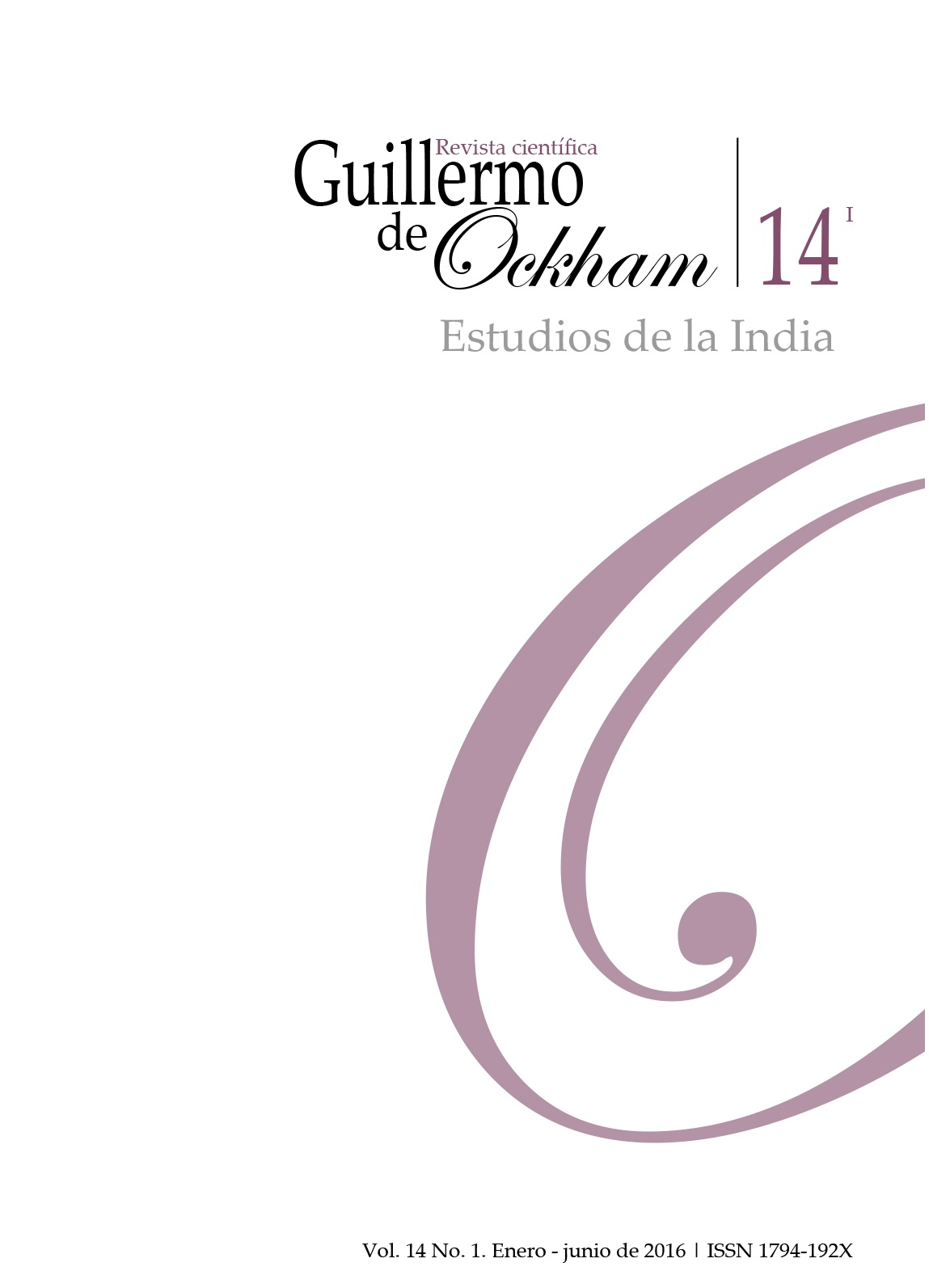La Revista Guillermo de Ockham brinda un acceso inmediato y abierto a su contenido, basado en el principio de ofrecer al público un acceso gratuito a las investigaciones para brindar un intercambio global de conocimiento. A menos que se establezca lo contrario, el contenido de esta revista tiene una licencia con Creative Commons Attribution-NonCommercial-NoDerivatives 4.0 International (CC BY-NC-ND 4.0) http://creativecommons.org/licenses/by-nc-nd/4.0/
- Atribución: debe otorgar el crédito correspondiente, proporcionar un enlace a la licencia e indicar si se realizaron cambios. Puede hacerlo de cualquier manera razonable, pero no de ninguna manera que sugiera que el licenciante lo respalda a usted o su uso.
- No comercial: no puede utilizar el material con fines comerciales.
- Sin derivados: si remezcla, transforma o construye sobre el material, no puede distribuir el material modificado.
- Sin restricciones adicionales: no puede aplicar términos legales o medidas tecnológicas que restrinjan legalmente a otros de hacer cualquier cosa que permita la licencia.
Resumen
The Sanskrit word, darśana, is generally translated into English as philosophy, but it is admittedly inadequate. The so-called six (āstika, affirmativist or orthodox) systems of philosophy have been described by Louis Renou as ‘philosophico-religious,’ since religion and philosophy cannot be separated in their tradition. On the other hand, Maurice Winternitz brands some of the six (such as Mīmāṃsā and Vedānta) as religion and some others (such as, Nyāya and Vaiśeṣika) as philosophy. A.K. Warder claims that, despite everything, religion and philosophy can be separated quite adequately, and the darśanas are all philosophies. All this however leaves the so-called six (nāstika, negativist or heterodox) systems, particularly the materialist systems out of consideration. While the Jain and the Buddhist systems do have religious associations, the pre-Cārvāka and the Cārvāka materialist systems remained thoroughly philosophical, untouched by any religion. The orthodox systems, mostly in their syncretic forms, became religio-philosophical (although some of them might have originated as philosophy) while the materialist systems retained their original secular character.
Palabras clave:
Referencias
Bhattacharya, R. (2013c). Verses Attributed to Bṛhaspati in the Sarvadarśana-saṃgraha: A Critical Appraisal. Journal of Indian Philosophy, 41:6, December 2013, pp. 615-32.
Chattopadhyaya, D. & Gangopadhyaya, M. K. (1990). Cārvaka/Lokāyata. New Delhi: Indian Council of Philosophical Research.
Chattopadhyaya, D. (1982). ‘Introduction’ to Mrinal Kanti Gangopadhyaya. Nyāya (trans. of the Nyāyasūtra and Vātsyāyana’s commentary). Calcutta: Indian Studies.
Chattopadhyaya, D. (1985). Knowledge and Intervention: Studies in Society and Consciousness. Calcutta: Firma KLM.
Chattopadhyaya, D. (2014). Science and Society in Ancient India (first published 1977). Kolkata: K P Bagchi & Company.
Cimanabhaṭṭa. (1923). Āryavidyāsudhākara. Lahore: Moti Lal Banarsi Das.
Cowell, E. B. (ed. and trans.). (1935). The Maitrī or Maitrāyaṇīya Upanishad, etc. Calcutta: Asiatic Society of Bengal.
Dasgupta, S. (1946). Obscure Religious Cults as Background of Bengali Literature. Calcutta: University of Calcutta (reprinted 1969, 1976, 1985).
Deva, R. (1836 śaka). Śabdakalpadruma. Kalikata: Hitavadi Karyyalaya,.
Franco, E. (1997). Dharmakīrti on Compassion and Rebirth. Wien: Arbeitkreis für Tibetische und Buddhistische Studien, Universität Wien.
Gerschhiemer, G. (2000-2001). Religions de l’Inde: védisme et hindouisme classique: Confé-rences de M. Gerdi Gerschhiemer, Annuaire EPHE, Section des sciences religieuses, T: 109 , 173-189
Gerschhiemer, G. (2007). Les ‘‘Six doctrines de spéculation’’ (ṣaṭtarkī) – Sur la categorization variable des systems philosophiques dans l’Inde classique. In: Karin Preisendanz (ed.). Ex-panding and Merging Horizons (Wilhelm Halbfass Memorial Volume). Vienna: Austrian Academy of Sciences Press, 239-258.
Guṇaratna. (1905-14) Tarkarahasyadīpikā, Commentary on Haribhadra’s Ṣaḍdarśanasamuccaya. Calcutta: The Asiatic Society.
Halbfass, W. (1988). India and Europe: An Essay in Understanding. New York: State University of New York (German edition 1981).
Halbfass, W. (1992). Competing Causalities: Karma, Vedic ritual, and the Natural World. Tradition and Reflection: Explorations in Indian Thought. Delhi: Indian Books Centre.
Jha, S. (1999). Bastubādī Bāul. Kolkata: Lokosamskriti o Adivasi Samskriti Kendra.
Kamalaśīla. (1981). Tattvasaṅgrahapañjikā in Śāntarakṣita. Tattvasaṅgraha . Varanasi: Bauddhabharati.
Kane, P. V. (1973). History of Dharmaśāstra, Vol. 4. Poona: Bhandarkar Oriental Research In-stitute.
Madhusūdana S. (1977). Prasthānabhedaḥ. Poona: Ananda Ashrama.
Manu. M. (1972-84). Ed. J.H. Dave. Bombay: Bharatiya Vidya Bhavan.
Moghe, S. G. (2000). History of Dharma-Śāstra in Essence. Mumbai: MM. Dr. P. V. Kane Me-morial Trust.
Müller, F. M. (1971). The Six Systems of Indian Philosophy (first published 1899). Varanasi: The Chowkhamba Sanskrit Series Office.
Ruben, W. (1962/1966). Uddālaka and Yājñavalkya. Materialism and Idealism, Indian Studies Past and Present, Vol. 3 No. 3, April-June 1962, pp.345-54, reprinted in his Studies in Ancient Indian History, Calcutta: Indian Studies Past and Present, 1966.
Śaṅkara. (1982). The Brahmasūtra Śaṅkara Bhāṣya. With the Commentaries Bhāmatī, Kalpataru and Parimala. Varanasi: Chowkhamba Sanskrit Series Office.
Śaṅkarācārya. (1979). Īśādidaśopaniṣadaḥ Śaṃkarabhāṣyasametaḥ. Dilli: Motilal Banarsidass.
SDS Sāyaṇa-Mādhava. (1978). Sarvadarśanasaṅgraha. Ed. V. Shastri Abhyankar. Poona: Bhandarkar Oriental Research Institute, (reprint).
SDS Trans. E. B. Cowell and A. E. Gough. (1981). Ed. K. L. Joshi. Ahmedabad-Delhi: Parimal Publication. (Chap. 1 reprinted in C/L 246-57). Cowell’s translation of SDS, chap.1 first ap-peared in Pandit 9, 1874-75.
ṢDSam Haribhadra. (1905-1914). Ṣaḍ-darśana-samuccaya. Edited by Luigi Suali. Calcutta: The Asiatic Society.
Van Buitenen, J. A. B. (1962) The Maitrāyaṇīya Upaniṣad. A Critical Essay, with Text, Transla-tion and Commentary. ’S-Gravenhage: Mouton & Co.
Vidyabhusana, Satish Chandra. (1988). A History of Indian Logic. (first published 1920). Delhi: Motilal Banarsidass,
Warder, A. K. (1971). Outlines of Indian Philosophy. Delhi: Motilal Banarsidass.
Whitney, W. D. (1890). Translation of the Kaṭha-Upaniṣad, Transactions of the American Philological Association (1869-1896). Vol. 21, 88-112 (available on the net).
Winternitz, M. (1985). History of Indian Literature. Vol. 3. Delhi: Motilal Banarsidass.
































